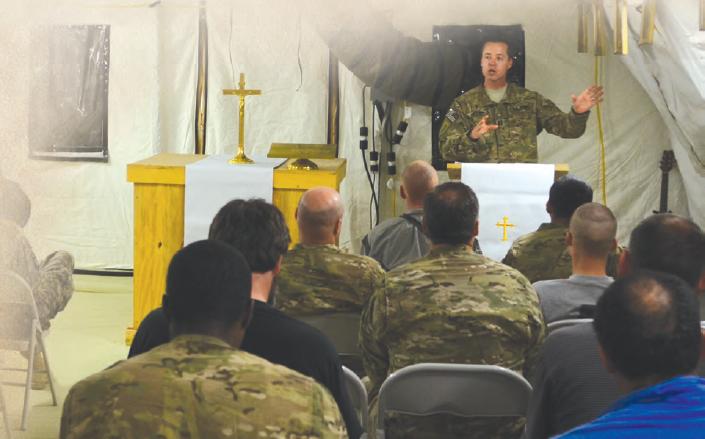By Army Capt. Michael N. Frese,
Forward Operating Base Andar,
Afghanistan
Editor’s Note: Chaplain Frese is attached to a light infantry unit of 900 soldiers and 300 civilians spread across five bases in the rugged territory of eastern Afghanistan. As the sole chaplain, he travels regularly to provide worship services, Bible studies and pastoral counseling for 1,200 people.
 We are in constant danger of roadside bombs, rocket attacks and ambushes, and we experience between three and eight of these events daily. The perils of death and destruction surround my soldiers and me for the entire 12-month deployment. I count it as a privilege and duty to face the dangers of war with the soldiers in my unit.
We are in constant danger of roadside bombs, rocket attacks and ambushes, and we experience between three and eight of these events daily. The perils of death and destruction surround my soldiers and me for the entire 12-month deployment. I count it as a privilege and duty to face the dangers of war with the soldiers in my unit.
“The comfort that Christ gives in Word and Sacrament takes on deeper meaning to soldiers under constant threat of death.”
There is nothing like death to focus us more clearly on life. In this dangerous environment, I am God’s mouthpiece to share with them the life that Christ has won for them on the cross. Many of my soldiers have been wounded by either bullets or shrapnel, and three have been killed in action. It is only by God’s grace and mercy that we have not had more deaths. In the flash of a moment, a soldier’s life can change dramatically. Battlefield injuries are traumatic. Many people are affected by the injury of an individual soldier — his fellow buddies who were with him on the battlefield, the medics who attend to him, his commanding officers who planned the mission where he was injured and his family and friends back home.
In the aftermath of a casualty, my duty is to be there to pray and talk with the wounded soldiers who come into our aid station. Reading passages of Scripture with them is comforting to the wounded and the medics who attend to them. It is also important for me to hear their account of the incident. Retelling their story to me is a necessary step in processing the traumatic event. They have to come to terms with their fears, perceptions, thoughts, memories, feelings and any regrets that they now experience. That’s my duty to them — to put them on the healthy road of emotional recovery. In the anguish of seeking meaning out of misery, I endeavor to show my soldiers an eternal perspective. I attempt to bring their gaze away from the horror and destruction of that moment to the hope of life beyond suffering, pain and death. In short, I preach to them about the One who rescues from sin and every evil.
“I pray that you would keep me this day also from sin and every evil.”
In worship services and in personal discussions, soldiers in this environment need to hear that God has not abandoned them. I share with them the words of St. Paul, that neither death, principalities, things present, things to come, homesickness, nor war can separate us from the love of God that is in Christ Jesus, our Lord (Rom. 8:38–39). The consolation of God’s love and grace in Christ comforts trembling hearts. When danger is a constant threat, they need to hear that Christ is with them more constantly, more surely. They need to hear that in the midst of physical and emotional affliction, only Christ offers true solace in the promise of His salvation: “Come to Me, all you who are weary and burdened, and I will give you rest” (Matt. 11:28).
The words of Luther’s Morning Prayer, which I have uttered since childhood, take on new meaning in the context of an intense deployment: “I pray that you would keep me this day also from sin and every evil.” God truly is gracious. He is merciful. He is present in every need. I thank Him for using me to show mercy and bring hope to soldiers while living and working in enemy territory.
“In short, I preach to them about the One who rescues from sin and every evil.”




